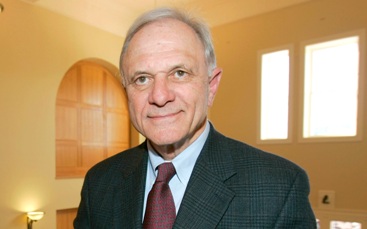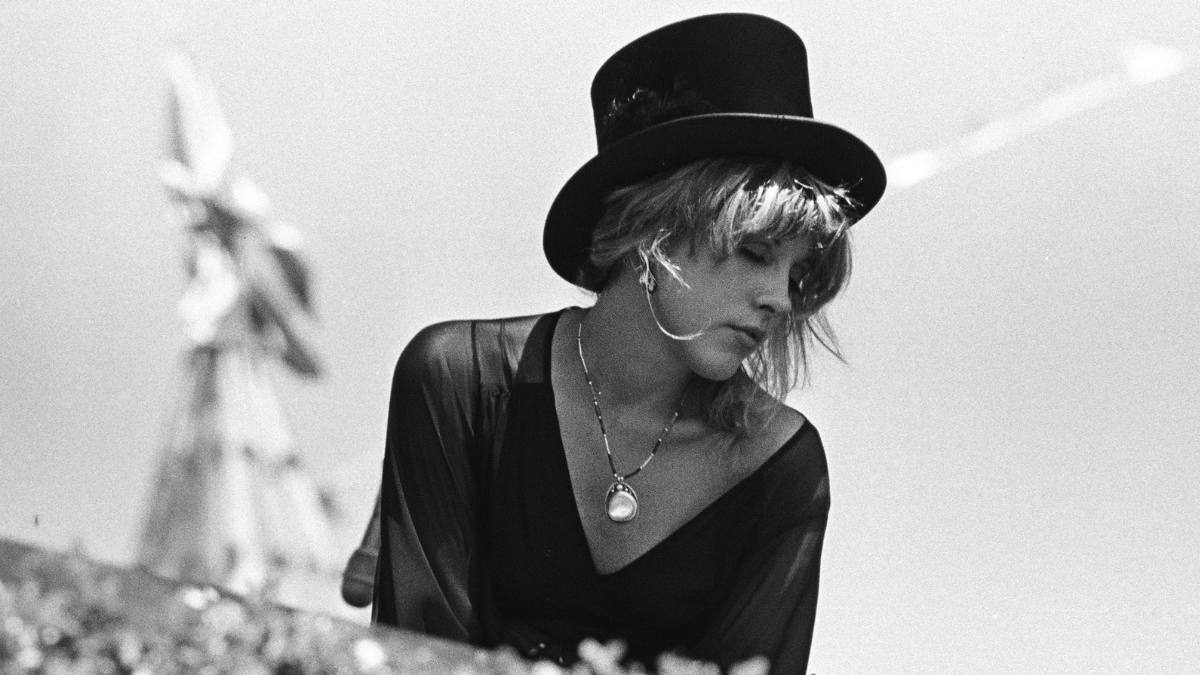NEW YORK — Under questioning this week, Michael Cohen described the nuts-and-bolts of how payment to the porn actor Stormy Daniels to bury her story of an alleged sexual encounter with former President Donald Trump worked.
It wasn’t until after a decade in the fold, after his family pleaded with him, after the FBI raided his office, apartment and hotel room, Cohen testified Tuesday, that he finally decided to turn on Trump.
The complicated break led to a 2018 guilty plea to federal charges involving the payment to Daniels and to other unrelated crimes.
And it’s that insider knowledge of shady deals that pushed Manhattan prosecutors to make Cohen the star witness in their case against Trump about that same payment, which they say was an illegal effort to influence the 2016 presidential election.
“To keep the loyalty and to do the things that he had asked me to do, I violated my moral compass, and I suffered the penalty, as has my family,” Cohen testified Tuesday.
But defense attorneys sought to portray Cohen as motivated by vengeance toward his former boss, confronting him on the witness stand with his own profane social media about Trump and wanting to see the former president in handcuffs.
The Republican presidential nominee has pleaded innocent and denies that any of the encounters took place.
As prosecutors laid out their case, Cohen testified about purposefully mislabeled checks, false receipts and blind loyalty that placed Trump at the center of the scheme. The testimony, somewhat dry for a man who was defined for years by his attitude as Trump’s problem-zapper, underscored the prosecution’s foundational argument — that the case isn’t about the spectacle of what Trump was paying for, but rather his effort to illegally cover up those payments.
Cohen has testified in detail about how the former president was linked to all aspects of the hush money scheme, and prosecutors believe Cohen’s testimony is critical to their case. But their reliance on a witness with such a checkered past — he was disbarred, went to prison and separately pleaded guilty to lying about a Moscow real estate project on Trump’s behalf — could backfire, especially as Trump’s attorneys continue to cross-examine him.
One of Trump’s attorneys, Todd Blanche, spent no time Tuesday asking about the allegations at the center of the trial, instead working to raise doubts about Cohen’s credibility and his motivation for helping prosecutors try to put Trump behind bars.
Amid rapid-fire objections from prosecutors, Blanche probed Cohen’s hyperfocus on Trump, suggesting he’s attempted to parlay his insider knowledge into a reduced prison sentence and court supervision for his own crimes, and a new career making millions of dollars criticizing Trump.
Cohen was asked to listen through headphones to a snippet of his podcast, as was Trump while sitting at the defense table. Blanche asked Cohen if he recalled an October 2020 episode in which he said Trump needs to wear handcuffs and that “people will not be satisfied until this man is sitting inside a cell.”
“I wouldn’t put it past me,” Cohen testified.
“Is it fair to say you’re motivated by fame?” Blanche asked.
“No sir, I don’t think that’s fair to say,” Cohen said. “I’m motivated by many things.”
Cohen will be the prosecution’s last witness. Trump’s defense will begin after Cohen, though it’s not clear whether his lawyers will call any witnesses or if Trump will testify in his own defense.
Jurors have already heard how Trump and others in his orbit were reeling after the leak just a few weeks before the 2016 election of an “Access Hollywood” tape in which he bragged about grabbing women by the genitals without their permission. The publication of the tape hastened the payments to Daniels, according to testimony.
Cohen testified that Trump was constantly apprised of the behind-the-scenes efforts to bury stories feared to be harmful to the campaign. And after paying out $130,000 to Daniels in order to keep her quiet about an alleged sexual encounter, Trump promised to reimburse him.
Jurors followed along as prosecutor Susan Hoffinger walked Cohen through that reimbursement process. It was an attempt to show what prosecutors say was a lengthy deception to mask the true purpose of the payments.
As jurors were shown business records and other paperwork, Cohen explained their purpose and reiterated again and again that the payments were reimbursements for the hush money — they weren’t for legal services he provided or for a retainer.
It’s an important distinction, because prosecutors allege that the Trump records falsely described the purpose of the payments as legal expenses. These records form the basis of 34 felony counts charging Trump with falsifying business records. All told, Cohen was paid $420,000, with funds drawn from a Trump personal account.
“Were the descriptions on this check stub false?” Hoffinger asked.
“Yes,” Cohen said.
“And again, there was no retainer agreement,” Hoffinger asked.
“Correct,” Cohen replied.
But prosecutors also spent time working to blunt the potential credibility issues, painting Cohen as a longtime Trump loyalist who committed crimes on behalf of the former president. On the witness stand, Cohen described in detail the April 2018 raid that marked the beginning of the end of his time being devoted to Trump.
“How to describe your life being turned upside-down? Concerned. Despondent. Angry,” Cohen told the jury.
“Were you frightened?” Hoffinger asked.
“Yes, ma’am,” he said.
But he was heartened by a phone call from Trump that he said gave him reassurance and convinced him to remain “in the camp.”
He said to me, ‘Don’t worry. I’m the president of the United States. There’s nothing here. Everything’s going to be OK. Stay tough. You’re going to be OK,’” Cohen testified.
Cohen, who once boasted that he would “take a bullet” for Trump, told jurors that he “felt reassured because I had the president of the United States protecting me. … And so I remained in the camp.”
It was his wife and family who finally made him see how sticking by Trump was detrimental.
“What are you doing? We’re supposed to be your first loyalty,” Cohen testified. “It was about time to listen to them,” he said.
Throughout Cohen’s testimony Tuesday, Trump reclined in his chair with his eyes closed and head tilted to the side. He occasionally shifted and leaned forward, opening his eyes and talking to his attorney before returning to his recline. Even some of the topics that have animated him the most as he campaigns didn’t stir his attention.
It was a far cry from the scene last October, when the once-fierce allies faced off at Trump’s civil fraud trial and Trump walked out of the courtroom after his lawyer finished questioning Cohen.
“Mr. Cohen, do you have any regrets about your past work for Donald Trump?” Hoffinger asked as she concluded her questioning.
“I do,” Cohen said. “I regret doing things for him that I should not have. Lying. Bullying people to effectuate a goal. I don’t regret working for the Trump Organization. As I expressed before, I had some very interesting, great times.”
Information for this article was contributed by Jill Colvin and Lisa Mascaro of The Associated Press.
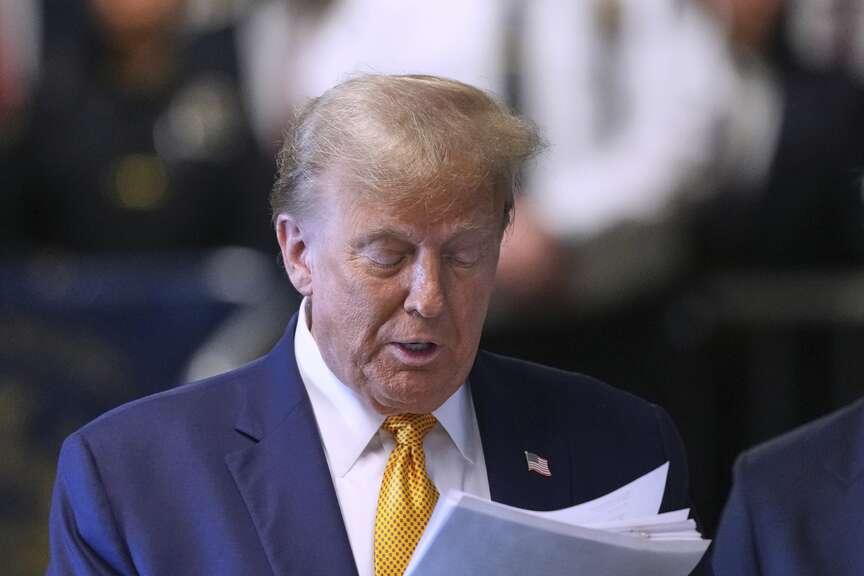 Former President Donald Trump speaks to the media outside Manhattan criminal court in New York, on Tuesday, May 14, 2024. (Curtis Means/Pool Photo via AP)
Former President Donald Trump speaks to the media outside Manhattan criminal court in New York, on Tuesday, May 14, 2024. (Curtis Means/Pool Photo via AP)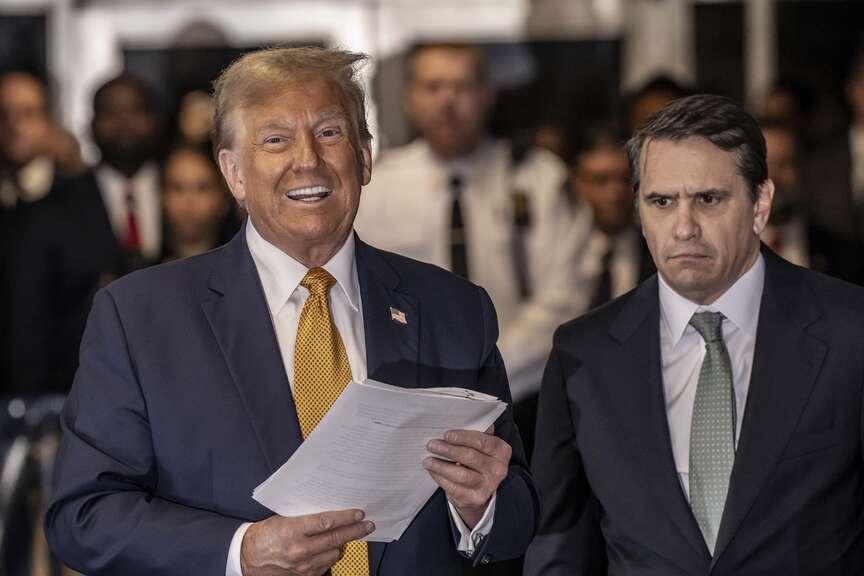 Former President Donald Trump speaks to the media outside Manhattan criminal court before his trial in New York, Tuesday, May 14, 2024. (Mark Peterson/Pool Photo via AP)
Former President Donald Trump speaks to the media outside Manhattan criminal court before his trial in New York, Tuesday, May 14, 2024. (Mark Peterson/Pool Photo via AP) Eric Trump looks on as his father, former President Donald Trump arrives at Manhattan criminal court in New York, on Tuesday, May 14, 2024. (Curtis Means/Pool Photo via AP)
Eric Trump looks on as his father, former President Donald Trump arrives at Manhattan criminal court in New York, on Tuesday, May 14, 2024. (Curtis Means/Pool Photo via AP)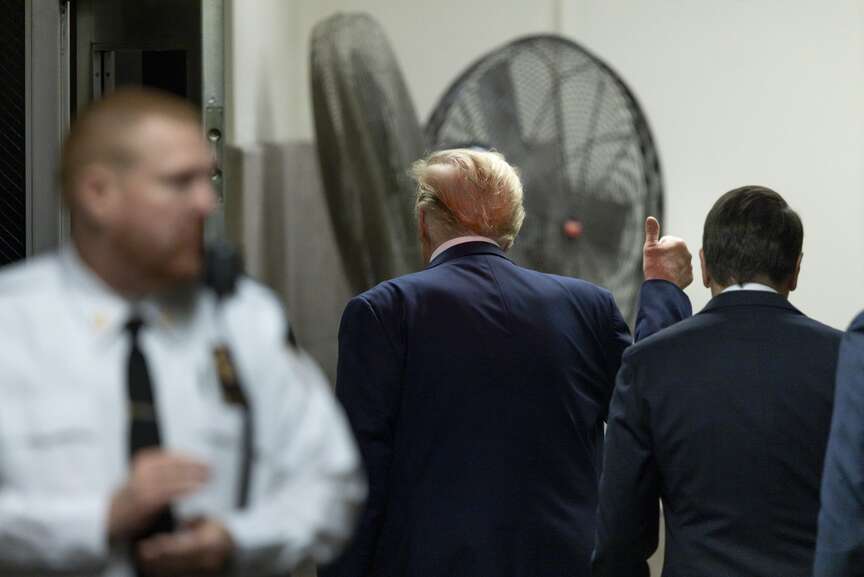 Former President Donald Trump gives a thumbs-up as he exits the courtroom during a break at Manhattan criminal court before his trial in New York, Tuesday, May 14, 2024. (Justin Lane/Pool Photo via AP)
Former President Donald Trump gives a thumbs-up as he exits the courtroom during a break at Manhattan criminal court before his trial in New York, Tuesday, May 14, 2024. (Justin Lane/Pool Photo via AP)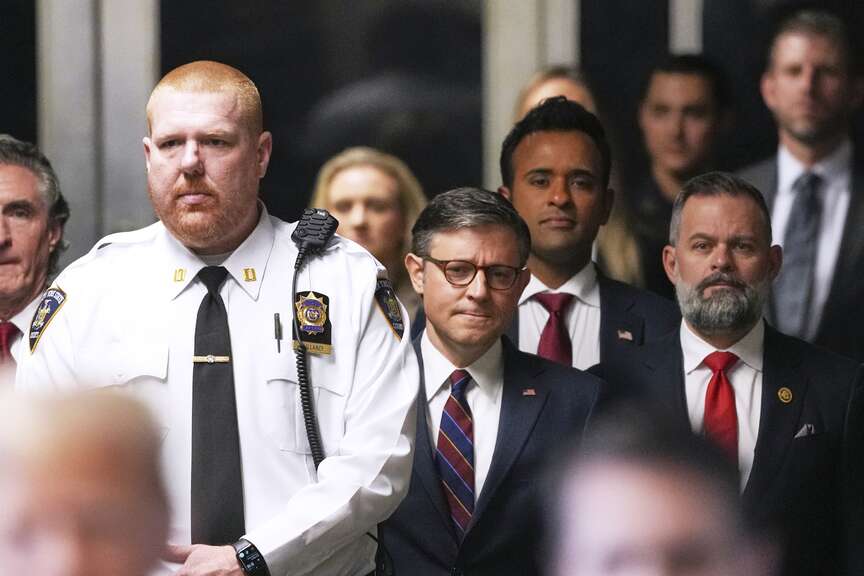 From left U.S Speaker of the House Mike Johnson, businessman Vivek Ramaswamy and Republican Congressman Cory Mills of Florida listen as former President Donald Trump talks with reporters outside Manhattan criminal court before his trial in New York, Tuesday, May 14, 2024. (Curtis Means/Pool Photo via AP)
From left U.S Speaker of the House Mike Johnson, businessman Vivek Ramaswamy and Republican Congressman Cory Mills of Florida listen as former President Donald Trump talks with reporters outside Manhattan criminal court before his trial in New York, Tuesday, May 14, 2024. (Curtis Means/Pool Photo via AP)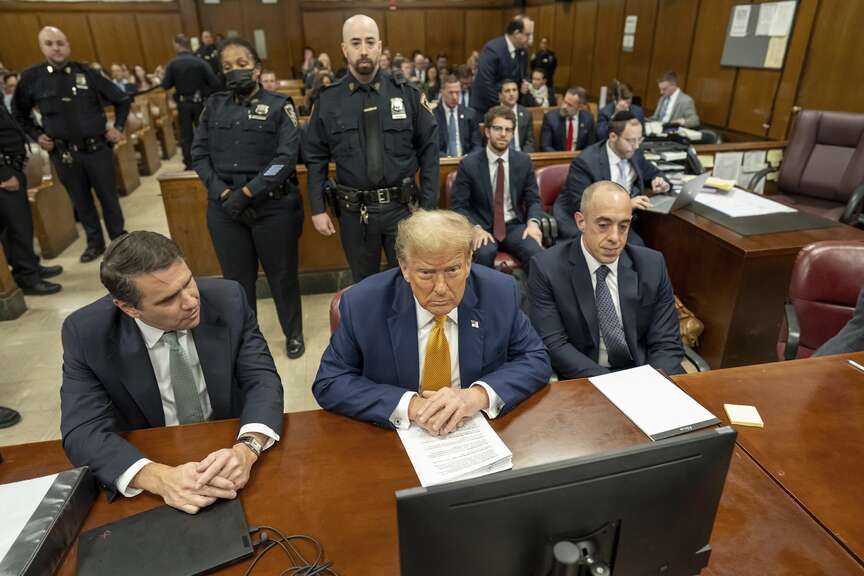 Former President Donald Trump appears at Manhattan criminal court before his trial in New York, Tuesday, May 14, 2024. (Mark Peterson/Pool Photo via AP)
Former President Donald Trump appears at Manhattan criminal court before his trial in New York, Tuesday, May 14, 2024. (Mark Peterson/Pool Photo via AP)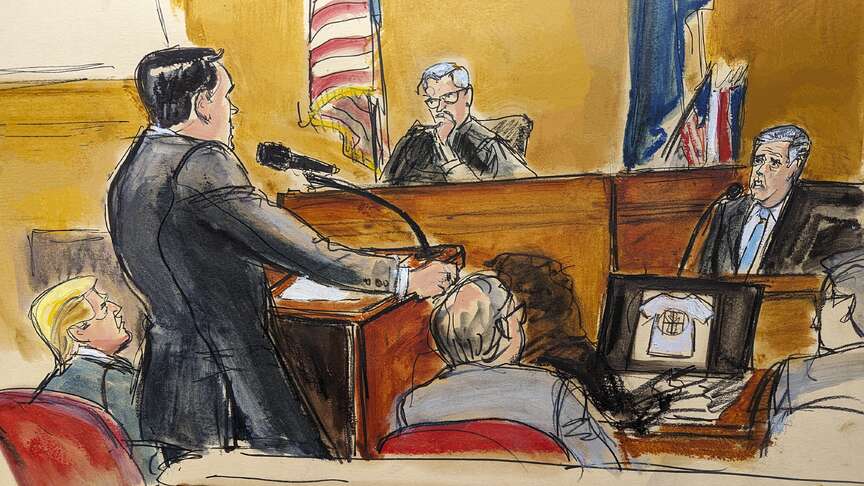 Defense attorney Todd Blanche cross examines Michael Cohen in Manhattan criminal court, Tuesday, May 14, 2024, in New York. Cohen returned to the witness stand Tuesday, testifying in detail how former president was linked to all aspects of a hush money scheme that prosecutors say was aimed at stifling stories that threatened his 2016 campaign. (Elizabeth Williams via AP)
Defense attorney Todd Blanche cross examines Michael Cohen in Manhattan criminal court, Tuesday, May 14, 2024, in New York. Cohen returned to the witness stand Tuesday, testifying in detail how former president was linked to all aspects of a hush money scheme that prosecutors say was aimed at stifling stories that threatened his 2016 campaign. (Elizabeth Williams via AP)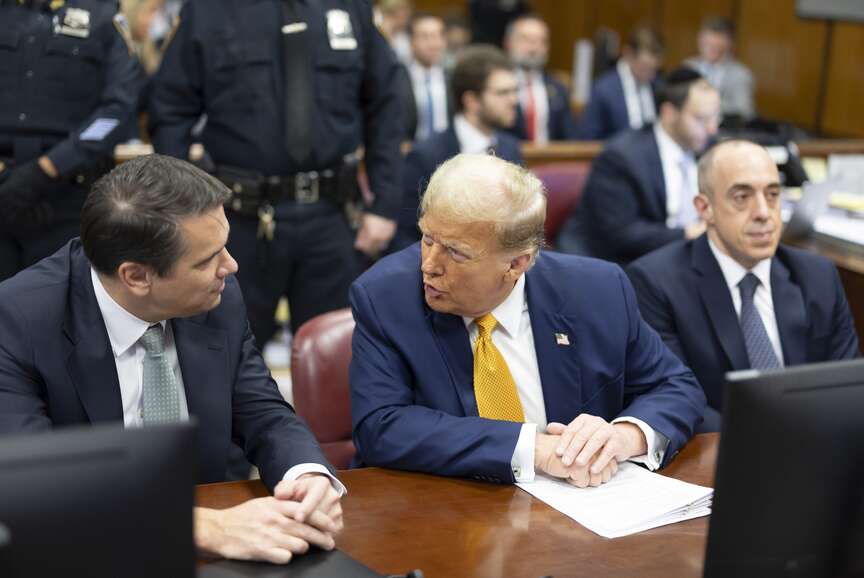 Former President Donald Trump appears at Manhattan criminal court before his trial in New York, Tuesday, May 14, 2024. . (Justin Lane/Pool Photo via AP)
Former President Donald Trump appears at Manhattan criminal court before his trial in New York, Tuesday, May 14, 2024. . (Justin Lane/Pool Photo via AP)
